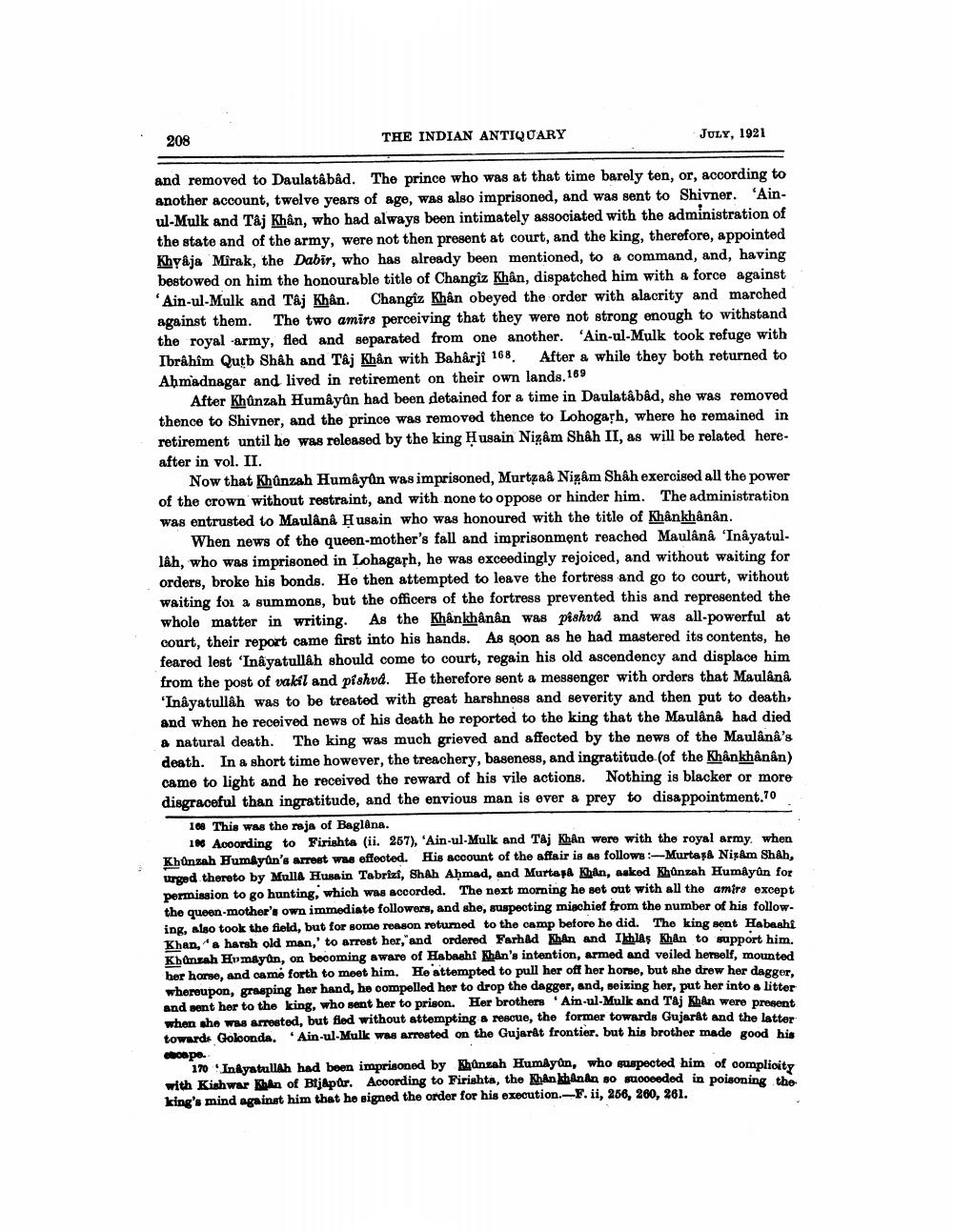________________
208
THE INDIAN ANTIQUARY
JULY, 1921
and removed to Daulatâbâd. The prince who was at that time barely ten, or, according to another account, twelve years of age, was also imprisoned, and was sent to Shivner. 'Ainul-Mulk and TÂj Khân, who had always been intimately associated with the administration of the state and of the army, were not then present at court, and the king, therefore, appointed Khyaja Mirak, the Dabir, who has already been mentioned, to a command, and, having bestowed on him the honourable title of Changiz Khân, dispatched him with a force against 'Ain-ul-Mulk and Tâj Khân. Changiz Khân obeyed the order with alacrity and marched against them. The two amirs perceiving that they were not strong enough to withstand the royal -army, fled and separated from one another. 'Ain-ul-Mulk took refuge with Ibrahîm Qutb Shâh and Taj Khân with Bahârji 168. After a while they both returned to Ahmadnagar and lived in retirement on their own lands. 169
After Khânzah Humâyûn had been detained for a time in Daulatâbâd, she was removed thence to Shivner, and the prince was removed thence to Lohogarh, where he remained in retirement until he was released by the king Husain Nizam Shâh II, as will be related hereafter in vol. II.
Now that Khûnzah Humâyên was imprisoned, Murtzaâ Nizam Shah exercised all the power of the crown without restraint, and with none to oppose or hinder him. The administration was entrusted to Maulânâ Ņusain who was honoured with the title of Khânkhånân.
When news of the queen-mother's fall and imprisonment reached Maulânâ 'Inayatul. lâh, who was imprisoned in Lohagash, he was exceedingly rejoiced, and without waiting for orders, broke his bonds. He then attempted to leave the fortress and go to court, without waiting for a summons, but the officers of the fortress prevented this and represented the whole matter in writing. As the Khânkhånån was pishva and was all-powerful at court, their report came first into his hands. As soon as he had mastered its contents, he feared lest 'Inâyatullah should come to court, regain his old ascendency and displace him from the post of vakil and píshvd. He therefore sent a messenger with orders that Maulânâ 'Inayatullah was to be treated with great harshness and severity and then put to death, and when he received news of his death he reported to the king that the Maulana had died a natural death. The king was much grieved and affected by the news of the Maulânâ's death. In a short time however, the treachery, baseness, and ingratitude (of the Khânkhânân) came to light and he received the reward of his vile actions. Nothing is blacker or more disgraceful than ingratitude, and the envious man is ever a prey to disappointment. 70
168 This was the raja of Baglâna.
1x According to Firishta (ii. 267), 'Ain-ul-Mulk and Taj Khan were with the royal army. when Kh Anzah Humayûn's arrest was effected. His account of the affair is as follows -Murtaza Nişam Shah, urged thereto by Mulla Husain Tabrizi, Shah Ahmad, and Murtaza Khan, asked Khunzah Humâyûn for permission to go hunting, which was accorded. The next morning he set out with all the amirs except the queen-mother's own immediate followers, and she, suspecting mischief from the number of his follow. ing, also took the field, but for some reason returned to the camp before he did. The king sent Habashi Khan,a harsh old man,' to arrest her, and ordered Farhad Khan and Ikhlas Khan to support him. Khanzah Humayun, on becoming aware of Habashi Khan's intention, armed and veiled herself, mounted her horse, and came forth to meet him. He attempted to pull her off her horse, but she drew her dagger. whereupon, groeping her hand, he compelled her to drop the dagger, and, seizing her, put her into a litter and sent her to the king, who sent her to prison. Her brothers 'Ain-ul-Mulk and Taj Khan were present when she was arrested, but fled without attempting & rescue, the former towards Gujarat and the latter towards Goloonda. 'Ain-ul-Mulk was arrested on the Gujarat frontier, but his brother made good his coope.
170 Infyatullah had been imprisoned by Khanzah Humayan, who suspected him of complicity with Kishwar Khan of Bti&pur. Acoording to Firishta, the Khan Anin so succeeded in poisoning the king's mind against him that he signed the order for his execution.-F. ii, 266, 260, 261.




